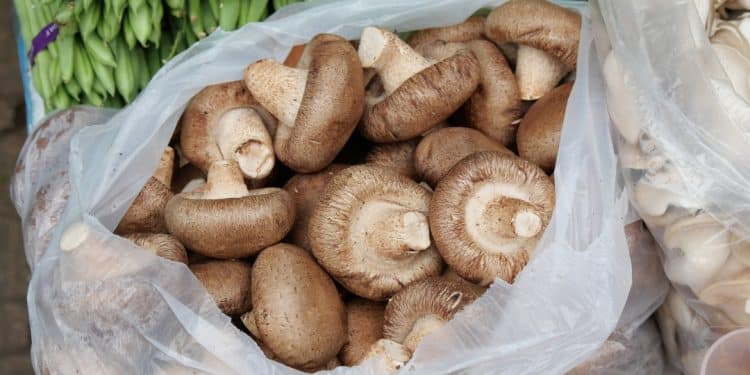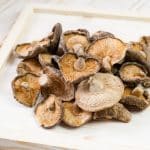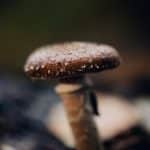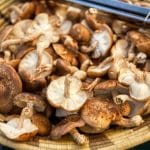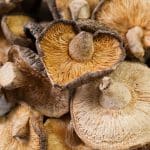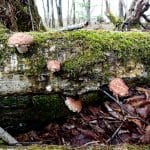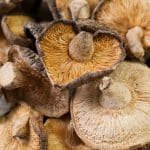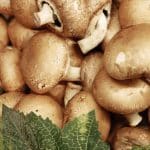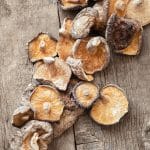Shiitake mushrooms are an excellent cooking ingredient due to their intense flavors, meaty texture, and high nutritional content. Shiitake mushrooms are also easy to buy in just about any grocery store.
But if you buy too many, you might ask yourself, How long will my shiitake mushrooms last before they spoil? Shiitake mushrooms will last for a day at room temperature, and up to 14 days in the refrigerator, as well as up to 9 months if they are dehydrated, and up to one year in the freezer if stored correctly. The best way to store Shiitake mushrooms in your fridge is to keep them in a brown baggie in your crisper drawer. In this post, we are going to talk a little bit more about Shiitake mushrooms shelf life, how to properly store them in your refrigerator or freezer, and how to tell when they are spoiling.
You can find our favorite supplements containing Shiitake Mushrooms on the following page of our website to learn more.
How Long do Shiitake Mushrooms Last in The Fridge?
Depending on how you keep your shiitake mushrooms, they may keep for anywhere between 12 hours and up to 12 months. Shiitake mushrooms stored at room temperature have the least shelf life, but if frozen, they can last for up to 12 months.
Storage method Shelf life:
At room temperature: 12 hours – 1 day
In the fridge, cooked: 3 – 5 days
In the fridge, sliced mushroom: 4 – 7 days
In the fridge, whole mushroom: 7 – 14 days
Dehydrated (dried): Up to 9 months
Freezer: 9 – 12 months
Freezing is not the ideal method of storing shiitake mushrooms, though, because it negatively affects texture as well as the number of nutrients and vitamins that are available in the mushrooms. We cover this topic more extensively later on in this post. The most common, best way to store shiitake mushrooms is a paper bag or airtight container stored in your refrigerators crisper drawer. This method of storage will give you approximately 7-14 days of shelf life before Shiitake mushrooms start turning slimy and spoiled.
What is the Best Way to Store Shiitake Mushrooms?
The best way to store shiitake mushrooms is a paper baggie inside your refrigerators crisper drawer. It is important to use a crisper drawer so the mushrooms do not soak up any other flavors and odors that might circulate through your refrigerator. A paper bag is the most ideal storage container as it is porous, which allows Shiitake mushrooms to breathe, which keeps the moisture from building up.
An alternate method to store your Shiitake mushrooms compared to a bag is to place several sheets of paper towels on the ground, then stack the Shiitake mushrooms on the papers towels in rows. Once you have laid down the mushrooms, fold the paper towel over the mushrooms several times, leaving the ends of the paper towel exposed. Place the Shiitake mushrooms wrapped in the paper towel, face-down, onto a dish, and put in your refrigerators crisper drawer.
Both methods will prolong your Shiitake mushrooms shelf life by seven to 12 days, as opposed to only one day at room temperature. Additionally, your mushrooms will retain their wonderful flavors, textures, and nutrient benefits. Shiitake mushrooms are an excellent source of fiber, Vitamin B, minerals, and contain a variety of amino acids commonly found in meats.
How to Tell if Your Shiitake Mushrooms Have Gone Bad or Spoiled
Shiitake mushrooms, like any mushrooms, show a few telltale signs when they are spoiling. When you spot these signs, it is best to toss your Shiitake batch. If you sniff your Shiitake mushrooms to see if they are spoiled, you might notice a scent, but you might wonder, is that just the way Shiitake mushrooms smell, or are they really spoiled.
When they are fresh, Shiitake mushrooms should smell like earthy, nutty, almost garlicky. When dehydrated, those smells intensify, with some people describing a sulphurous, almost cheese-like flavor. Shiitake mushrooms should never smell acidic, ammonia-like, or too pungent. If they develop a sour or ammonia-like odor, toss out the shiitake mushrooms.
How Can You Keep Shiitake Mushrooms Fresh Longer?
The only significant way to prolong your shiitake mushrooms shelf life, assuming you already implemented the proper preservation practices (i.e., keeping them in a paper bag in your crisper), is to prepare them. When your Shiitake mushrooms are approaching the end of their shelf life and are in danger of turning slimy, cooking them will extend the shelf life by several days. Cooked Shiitake mushrooms stored in a refrigerator will keep for three to five more days before they begin spoiling.
Can You Freeze Shiitake Mushrooms?
You can freeze shiitake mushrooms for up to 12 months, but this is not recommended because it would loss its distinctive texture and its high nutritional content. Steam-blanch your Shiitake mushrooms before freezing. This is the best way to retain nutrient value from your mushrooms, which is usually lost in raw freezing. When cooking shiitake mushrooms that have been frozen, always be sure to cook them when still frozen, do not defrost beforehand.
If you thaw them before you cook, you will end up with a much less pleasant texture, and run the risk of having your Shiitake mushrooms spoil really fast. Remove any excess dings with your mushrooms brush or a paper towel, do not ever wash them, because they will become soggy. Place your cleaned Shiitake mushrooms onto a metal tray and put them in the freezer for several hours. Once the Shiitake mushrooms have frozen, take the metal tray out of the freezer and put into a zipper-lock bag. Once the Shiitakes are in the bag, press down on any extra air, then seal the bag.
Place your sealed zip-lock bag back into the freezer to store it for longer. Can you store shiitake mushrooms in a fridge? Shiitake mushrooms are supposed to be kept in a refrigerator, and this is considered to be the best method of preservation. Make sure you place your Shiitake mushrooms in a crisper drawer so they do not absorb any other smells or flavors when they are sitting in your refrigerator. To maximize the shelf life and freshness of the stored Shiitake mushrooms in your refrigerator, put them into a paper bag with its top folded over, or wrap them in a paper towel and put on a platter.
Can You Get Sick from Eating Shiitake Mushrooms That Have Gone Bad?
Eating bad shiitake mushrooms will get you sick. If you cooked spoiled mushrooms, your chances of getting sick drop a bit, because a lot of the bacteria will die when exposed to higher temperatures. It is never recommended that you consume spoiled shiitake mushrooms, so if you see any signs of deterioration, such as brown spots, dark gills, a strong smell, and/or slime buildup, you are better off throwing your Shiitake mushrooms away.
Learn more:
Shiitake mushroom vs portobello mushroom
